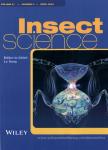MAPK signaling: A key element in plant defense response to insects
MAPK signaling: A key element in plant defense response to insects作者机构:Kunming Institute of Botany Chinese Academy of Sciences Kunming China Max Planck Institute for Chemical EcologyHans-Knoell Str. 8 07745 Jena Germany
出 版 物:《Insect Science》 (昆虫科学(英文版))
年 卷 期:2015年第22卷第2期
页 面:157-164页
核心收录:
学科分类:0710[理学-生物学] 071001[理学-植物学] 07[理学] 071009[理学-细胞生物学] 09[农学] 0901[农学-作物学] 090102[农学-作物遗传育种]
基 金:MCS is supported by the Max Planck Society and European the Thousand Young Talents Program, and aMax Planck Partner Group Program supported by the Yunnan Recruitment Program of Experts in Sciences CH was supported by a "Fellowship for Young International Scientists" from the Chinese Academy of Sciences
主 题:defense FAC insect jasmonate mitogen-activated protein kinase (MAPK) plant-insect interaction
摘 要:Insects have long been the most abundant herbivores, and plants have evolved sophisticated mechanisms to defend against their attack, In particular, plants can perceive specific patterns of tissue damage associated with insect herbivory. Some plant species can perceive certain elicitors in insect oral secretions (OS) that enter wounds during feeding, and rapidly activate a series of intertwined signaling pathways to orchestrate the biosynthesis of various defensive metabolites. Mitogen-activated protein kinases (MAPKs), common to all eukaryotes, are involved in the orchestration of many cellular processes, including development and stress responses. In plants, at least two MAPKs, salicylic acid-induced protein kinase (SIPK) and wound-induced protein kinase (WlPK), are rapidly activated by wounding or insect 0S; importantly, genetic studies us- ing transgenic or mutant plants impaired in MAPK signaling indicated that MAPKs play critical roles in regulating the herbivory-induced dynamics of phytohormones, such as jasmonic acid, ethylene and salicylic acid, and MAPKs are also required for transcriptional activation of herbivore defense-related genes and accumulation of defensive metabolites. In this review, we summarize recent developments in understanding the functions of MAPKs in plant resistance to insect herbivores.



